MEASURE Evaluation Blogs

A Virtual Relationship Building Skills While Generating Evidence
By Bridgit Adamou, MPH. Read about MEASURE Evaluation's small grants program, which helped fill much-needed evidence gaps in family planning and give a boost to USAID’s aim for countries to have stronger capacity for rigorous research.

Make adolescent and youth reproductive health programs responsive to needs with better data
By Bridgit Adamou, MPH. This Science Speaks blog post discusses research to identify gaps in the monitoring and evaluation of programs for adolescent and youth reproductive health.

HIV: Best practices lead to a practical guide for lowering mother-to-child transmission of HIV
By Elizabeth Sutherland, PhD. A Science Speaks blog post discusses findings from an evaluation of the Partnership for HIV-Free Survival.

COVID-19: This pandemic offers a lesson we must learn before the next
By Manish Kumar, MPH, MS, and Jim Thomas of MEASURE Evaluation, and Bobby Jefferson of DAI Global Health.

Integrating services works to curb HIV transmission from mothers to their infants and retain mothers in care, study shows
By Emily Bobrow, PhD. A combination of integrated service delivery approaches for mothers who are HIV-positive has been shown in Uganda to improve retaining mothers in HIV care and increasing exclusive breastfeeding for infants, plus providing an increase in completed HIV test results for babies at 18 months of age.

Qualitative Comparative Analysis in Case Management Systems: Worker Support Is a Predictor of Better Outcomes
By Zulfiya Charyeva. This USAID Learning Lab blog post discusses findings from a study of COVida—a USAID-funded orphans and vulnerable children program in Mozambique.

A Promising Data Quality Method to Save Time and Money
By David Boone, PhD. On World AIDS Day, here’s a suggestion on a method that has the potential to be a game changer for data quality assurance of routine HIV/AIDS program data.

Taking a long view: My Path to Becoming an Evaluation Professional
By Emily Weaver, PhD. This Data for Impact blog post reflects on the Evaluation 2019 conference.

Revised PLACE Manual Published with New and Updated Tools for Epidemic Control
By Sharon S. Weir, PhD. This blog post introduces the updated Priorities for Local AIDS Control Efforts (PLACE) method tool kit.

Gathering Data to Aid Children Often Overlooked
By Jacqueline Hellen, MPH and Lisa Parker, PhD. MEASURE Evaluation has developed a suite of survey indicators and tools and a guidance manual to assist programs to evaluate wellbeing outcomes. Photo at right: Copyright 2019 by Larry C. Price/Price and Price Creative LLC
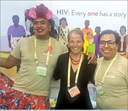
Tres Amigos: Mexico City, Frida Kahlo, and HIV Science
Nonconventional has been a theme running through this year's International AIDS Society Conference on HIV Science. Sessions focus on emerging research and groundbreaking HIV treatment options, but there’s also a reminder that people living with HIV are often stigmatized by their communities and the healthcare system.
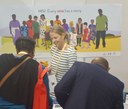
Remembering Who the Data Are For
This week at the International AIDS Conference on HIV Science (July 21–24, 2019), MEASURE Evaluation conducted a session titled “Measuring what counts: Maximizing the use of health information to speed country progress toward the 95-95-95 targets.”

A Conference on HIV Science and the People at the Center
By Liz Millar, MPH. This blog post introduces the IAS Conference on HIV Science and describes a MEASURE Evaluation session at the event.

New PRISM Series for Strengthening the Performance of Routine Health Information Systems
By Jim Thomas, PhD and Mamadou Alimou Barry, MS, MPH, DPharm. This blog post introduces the new, more comprehensive Performance of Routine Information Systems Management (PRISM) tools.

Deep Dive into Qualitative Data Gathering
By Brittany Iskarpatyoti, MPH, Data for Impact (D4I). This blog discusses ripple effect mapping, a new method for international health research—innovative in its approach to rapid qualitative data collection and analysis.

Thinking strategically about nutrition supports disease responses and more
By Heather B. Davis, MPH, and Emily A. Bobrow, PhD, MPH. This Sciences Speaks blog post introduces the new "Thinking Strategically About Nutrition: Key Issues in the Context of HIV and Tuberculosis" resource.

Thoughts on Establishing Malaria Trainings in Sierra Leone
By Ifeanyi Stanley Muoghalu, MD. This blog post analyses the relevance of the "Quick Country Start-Up Package for Malaria Surveillance, Monitoring, and Evaluation Training" in the context of Sierra Leone and offers some constructive observations.

Reaching men through index testing can speed path to first “90” — and epidemic control
By Mahua Mandal, PhD. This Science Speaks blog focuses on a brief from MEASURE Evaluation that reviewed and analyzed index testing data from Zimbabwe and Tanzania in 2018.

Leading with Local Experts Makes for Better Evaluation
by Heidi Reynolds, PhD. This blog post reflects on the 2019 African Evaluation Association (AfrEA) meeting.

Why Monitoring Project-Level Outcomes Is Important for PEPFAR Orphans and Vulnerable Children Programs
By Lisa Parker, PhD. We need data to be sure programs are improving children’s lives and preventing HIV. “Essential Survey Indicators” are helping.

Guinea study finds drops in facility-based births during West Africa Ebola crisis
By Janine Barden O’Fallon, PhD. This Science Speaks blog post focuses on a rapid assessment in Guinea that aimed to understand how the delivery and utilization of routine maternal, newborn, and child health services may have been affected by the strain Ebola placed on the health system and its clients.

Weighing the options for evaluation data: Are routine health data enough?
by Emily Weaver, PhD. This Science Speaks blog post discusses using existing data to conduct an evaluation of the Tibu Homa Project in Tanzania and shares lessons learned.

Looking for Cues of Project Impact: The Role of Causal Link Monitoring
By Ashley Strahley, MPH. This blog post discusses how the Data for Impact project is using causal link monitoring to keep on track.

Putting Countries in the Driver’s Seat—With the Keys
By Christina Villella, MPH. This blog discusses country ownership and management of digital health, a trending topic at the recent Global Digital Health Forum.

Study finds HIV care, diagnosis barriers for men fueling epidemic among young women
By Zahra Reynolds, MPH. This blog post from Science Speaks focuses on a study of adolescent girls and young women and their male sexual partners in eSwatini to obtain locally relevant, usable data.

Study finds diverse, but generally young and single men posing greatest HIV transmission risks to adolescent girls and young women
By Jen Chapman, PHD. A blog post from Science Speaks discusses a study that found reaching young men with prevention, treatment improves odds for female partners.

A Field Guide: PHE, SDG, and M&E
By Scott Moreland, PhD. A blog post from Medium introduces the new guide for monitoring and evaluating population-health-environment programs.

The Long and Winding Road: Partnerships, Self-Reliance, and the Path Forward
By Brittany Iskarpatyoti, MPH—It’s a wrap! The Global Health Systems Research (HSR) Symposium 2018 has officially ended. Posters have been taken down, booths have been packed up, delegates have flown back home—and now the real work happens. But what is the path forward?
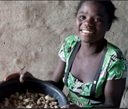
International Day of Rural Women—Preserving Women Farmers’ Benefits from the Crops They Produce
By Milissa Markiewicz, MPH, Research Associate, MEASURE Evaluation—In rural Zambia, groundnuts are considered a female-controlled crop. When a crop is commercialized, the resulting higher profits often attract men to the extent that they take over the crop and women lose control over its production and/or profits. However, a recent impact evaluation in Eastern Province, Zambia, found that increased commercialization of groundnut did not necessarily lead women to lose control over the crop.

Imagine: Ensuring No System Is Left Behind
By Brittany Iskarpatyoti, MPH, MEASURE Evaluation—One of the sub-themes for this year’s HSR conference is “Leaving no one behind: health systems that deliver for all.” As such, there’s been a global discussion on ensuring access to health for marginalized populations, universal health coverage, gender equality and the need for an intersectional approach in health systems strengthening.

Revolution: eHealth/mHealth Solutions for Improved Data
By Brittany Iskarpatyoti, MPH, MEASURE Evaluation—Liverpool locals, The Beatles once sang: “You say you want a revolution. Well, you know, we all want to change the world.” Here at the Health Systems Research conference in Liverpool, we’re talking about different kinds of revolutions: data and technology revolutions.

Fighting TB Starts with Data
By Stephanie Mullen, DrPH, and Jim Thomas, PhD, of MEASURE Evaluation—USAID announced September 26 a new approach to fight tuberculosis: the Global Accelerator to End TB, a business model to treat 40 million people by 2022 through performance-based investments. One of USAID’s initial efforts on this front is a program to improve the collection, analysis, use, and global harmonization of TB data.

Maturity Model-Based Assessment Tools for Digital Transformation
By Manish Kumar, Senior Technical Specialist, Health System Strengthening—Digital health—the use of electronic technologies, processes, and services for improving access to and use of healthcare services in low- and middle-income countries (LMICs)—presents many opportunities to contribute to the achievement of Sustainable Development Goal #3: “Ensure healthy lives and promote well-being for all at all ages.”

Come Together: Greetings from Liverpool and HSR2018
By Brittany Iskarpatyoti, MPH, Technical Specialist in M&E—This blog presents Brittany's first impressions from Liverpool and the Fifth Global Symposium on Health Systems Research and reflections on the vision of health for all.

Guide gives direction to the last 90
By Sharon Weir, PhD. Read a Science Speaks blog introducing a new tool to help better estimate how many people treated have achieved viral suppression.

Geospatial Prescriptions for Health Services
By Taurai Bwerinofa and Sarie Podges. Geography—more powerful than you might have guessed.

What is data use anyway?
By Michelle Li. A Science Speaks blog post discusses data use challenges and introduces a new resource providing guidance on how to measure data use in decision making.

Collection supporting HIV data gathering provides support for front lines
By Jackie Hellen, MPH. With community workers and program managers in mind, MEASURE Evaluation worked to develop an online collection of Community-Based Indicators for HIV Programs.

Digital health information systems are maturing to reflect realities on the ground
By Christina Villella, MPH. A Science Speaks blog post discusses how digital health information systems are maturing, shares related resources, and identifies areas for future focus.

Software helps prevent mother to child HIV transmission
By Cristina de la Torre, DSc, MPH. Post on using new DHIS 2 software that tracks individuals and events longitudinally to help monitor referrals and linkages across health services.

Analysis highlights hurdles between pregnant women with HIV and treatment
By Jennifer Yourkavitch, MPH, PhD. Research examines interactions among poverty, gender, and health systems that affect women’s participation in services to prevent HIV transmission from mother to child with a causal loop analysis.
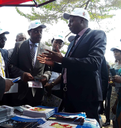
Health information system strengthening supports DRC government Ebola response
By Olivier Kakesa, MPH. Read about work in the Democratic Republic of Congo to strengthen the country's health information system.

Revamped Family Planning/Reproductive Health Indicators Database
By Bridgit Adamou, MPH. MEASURE Evaluation recently updated the Family Planning/Reproductive Health (FP/RH) Indicators Database.

In taking the One Health approach, is Senegal showing the way?
By Scott Moreland, PhD. The “One Health” approach—which considers animal, human, and environmental health as a unit—has gained momentum in response to the emergence of new infectious diseases at the human-animal-ecosystem interface.

Getting gender into your science means more than “add women and stir”
By Jessica Fehringer, PhD. Gender integration includes consideration of the gender constraints that shape health-seeking behavior and health outcomes for men and women.

Computing Power Can Get You Out of Some Tight Sampling Spots
By Peter Lance, PhD. At MEASURE Evaluation, we strive to be a technical leader—and that includes harnessing the raw computing power at our fingertips to advance the global public health learning agenda.

Health information systems for program evaluation: How to connect the dots?
By Manish Kumar, MPH, MS, and Heidi W. Reynolds, PhD. Program evaluation and health information systems (HIS) are interconnected. It therefore is wise that those setting up HIS and people charged with conducting evaluations of health programs should be in touch with one another.

Keeping the balance in how we prevent HIV: Evaluating structural interventions
By Jim Thomas, PhD. Read a Science Speaks blog post from Jim Thomas. Choosing means to address the HIV pandemic is not an either/or choice, it is both/and.

Evolving the Digital Health Landscape: Strengthening the Drivers of Digital Health Success
By Manish Kumar, MPH, MS. Digital innovations can improve health programs through improved capture, transmission, analysis, and use of health data. This post discusses sessions at the Global Digital Health Forum 2017 that touched on digital health drivers.

How a Functional Health Information System Can Improve Program Evaluation
By Heidi Reynolds, PhD, MPH. A functional health information system (HIS) can improve program evaluation in two ways: one, by producing data that can be used for evaluations, and two, by making those data easily accessible.

Where Can You Make the World a Better Place?
By John Spencer, MA. Google assembled people who use spatial tools to do good. MEASURE Evaluation produced this video to show how these tools can help improve health services.

Waves of Opportunity from Big Data, and the Wake of Questions Left Unanswered
By Brittany Iskarpatyoti, MPH. Big data was a key topic at the American Evaluation Association annual meeting, including the questions it raises.

The Importance of Technical Assistance
By Daijah Street. Writing a desk review to compare the work MEASURE Evaluation did in Guinea, Sierra Leone, and Liberia helped a student intern at MEASURE Evaluation understand the true importance of technical assistance.

What we’re reading: Geospatial analysis of HIV
By John Spencer, MA. To help spread innovative techniques we’ve observed in the literature, we’re highlighting four articles representative of four approaches for geospatial analysis.

Mass bed net distribution campaigns reduce health disparities across sub-Saharan Africa
By Courtney Chiaparas. In Asia and Africa, women and children are especially vulnerable to malaria. A study in Africa shows mass bed net campaigns are reducing health disparities across the region.

Study finds fear drives pregnant women with HIV from prevention services
By Valerie Flax, PhD, MPH. A study published in PLOS One investigated why HIV-positive pregnant women might drop out of a treatment program that would protect their infants and possibly save their lives.

Health Information System Architecture: Harmonized and Interoperable
By Manish Kumar, MPH, MS. Research in Bihar, India suggests that a federated information system architecture could facilitate access within the health sector to good-quality data from multiple sources, enabling strategic and clinical decisions for better health.

It’s Time for a New Question in Disease Outbreaks
By Brittany Iskarpatyoti, MPH. A new brief explores the importance of gender in monitoring and evaluation and suggests indicators that can reveal and explain gender gaps in emerging infectious disease outcomes.
The Power of Small Grants: Research that Opens Minds
By Bridgit Adamou, MPH. Small grants help strengthen capacity for health research in low-income countries.

Tidy Data and How to Get It
By John Spencer, MA. Untidy data can undermine even the strongest health information system and introduce a barrier to effective data use.

End Malaria for All
By Brittany Iskarpatyoti, MPH. A blog post explains why a focus on gender equity in anti-malaria programming and policies is fundamental to controlling, eliminating, and eradicating the disease.
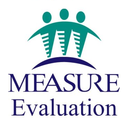
Whither the Impact Evaluation?
By Heidi Reynolds, PhD, and Sian Curtis, PhD. It is not necessary to limit impact evaluations, but instead to make smarter decisions about when investing in them is the best way to yield valid, usable information about the value of investing in a program for a given target population.

How to Help Community-Based mHealth Programs Collect High-Quality Data
By Michelle Li, MS. How can we ensure that our community-based mHealth programs are collecting accurate, high-quality data that will help us deliver the right services to the right places at the right time?

Planning the Future of Digital Health
By Sam Wambugu, MPH, PMP. Sharing thoughts on the 2016 Global Digital Health Forum.

Stemming the tide of HIV by addressing gender in Botswana
By Shelah Bloom, Sc.D. USAID in Botswana and MEASURE Evaluation conducted a gender analysis to identify barriers and make recommendations to help curtail HIV.

Project shows how to increase HIV treatment retention: Use the data you already have
By Kate Klein, MPH; Catherine Barker, MPH; Michelle Li, MS; and Nena do Nascimento, MPP. Blog discusses how to use existing data to increase HIV treatment retention.

Indicators to Measure Family Planning and HIV Integration
By Mary Freyder, MPH. A new manual recommends that all USAID missions use additional indicators to track family planning (FP)/HIV service delivery and client-focused outcomes.

Informing Investments in Health Information Systems
By Heidi Reynolds, PhD. What interventions work to strengthen a country’s health information systems so they improve the functioning of the country’s overall health system and, at the same time, provide data that satisfy the need for donors to report on international goals?

Mixed-Method Evaluations Lend Rigor to Design
By Heidi Reynolds, PhD. A blog post from the 2016 American Evaluation Association (AEA) annual meeting discusses mixed-method evaluations.

All About Gender
By Mahua Mandal, PhD, MPH. A blog from the 2016 American Evaluation Association (AEA) annual meeting recaps a session on Strengthening gender measures to improve the design of family planning and reproductive health program evaluations in low- and middle-Income countries.”

Identifying as an Evaluator
By Bridgit Adamou, MPH. A blog post from the American Evaluation Association’s 2016 conference shares conference experiences, including thoughts on identifying as an evaluator.

A Smarter Way to Build Health Information Systems?
By Jim Thomas, PhD. As countries measure progress on Sustainable Development Goals (SDGs), they should prioritize data needed to improve healthcare for people.

Resilience: More than a quick fix
By Jim Thomas, PhD. While our feet are still wet from the wave of sustainability, a new wave has come our way bearing the name of resilience. Prompted in part by the challenges that West African governments experienced in responding to Ebola, the development community wants to see systems that can withstand the next shock.

Getting from ‘Wow’ to Sustainability
By Jim Thomas, PhD. It’s an exciting prospect that disparate technologies could transform health information. But governments should know that there still will be specific questions they should ask before adopting any of them.

Preventing HIV through treatment of neglected tropical diseases could save billions
By Paul Brodish, PhD. Among girls and women, genital schistosomiasis increases the likelihood of later infection with HIV.

Sounds like Digital Innovation
By Kimberly Best. I’m a videographer no larger than the size of a carry-on bag.

Using Technology to Boost Healthcare
By Sam Wambugu, MPH, PMP. In developing countries and communities, information communication technologies have increasingly become the central cog in economic and social development.

Women Deliver Conference Diary
By Brittany Schriver, MPH, and Mahua Mandal, MPH, PhD. This series shares experiences, thoughts and session recaps from Women Deliver 2016.

Health through Measurement: Countries Learn How by Listening to Each Other
By Jim Thomas, PhD. The Health Data Collaborative comes to Dhaka, Bangladesh. Read about the meeting.

Building from One Emergency to the Next
By Jim Thomas, PhD. Health information systems strengthening in response to Zika virus can build on the insights and priorities identified for Ebola.

Ebola Diaries
By Scott McKeown, PhD. In the wake of the Ebola epidemic in West Africa, attention is focused on how to strengthen health systems in Guinea, Liberia, and Sierra Leone so that another such outbreak can be predicted and, perhaps, prevented. This blog shares information about life and work in Guinea.

Asking the Right Questions Post-Ebola
By Kathy Doherty. Three MEASURE Evaluation articles examine the Ebola outbreak and health systems in a larger context.

The Time is Now for Improving Routine Institution-based Health Information Systems
By Theo Lippeveld, MD, MPH. Robust routine institution-based health information systems generate the relevant data that district managers and care providers need to make decisions that ultimately will lead to sustainable health outcomes in the communities they serve.

Invest in the Future: Strengthen Malaria Programs with Gender Data
By Abby Cannon, MPH, MSW. On World Malaria Day, MEASURE Evaluation encourages all to increase and improve gender-related data collection to assist in strategy and planning for effective malaria prevention and response.

Tuberculosis Co-Infection with HIV Responds to Concurrent Treatment
By Martha P. Skiles, MPH, PhD, and Stephanie Mullen, DrPH. In 2014, USAID funded MEASURE Evaluation to initiate an impact evaluation in Ukraine for two TB programmatic priorities.












